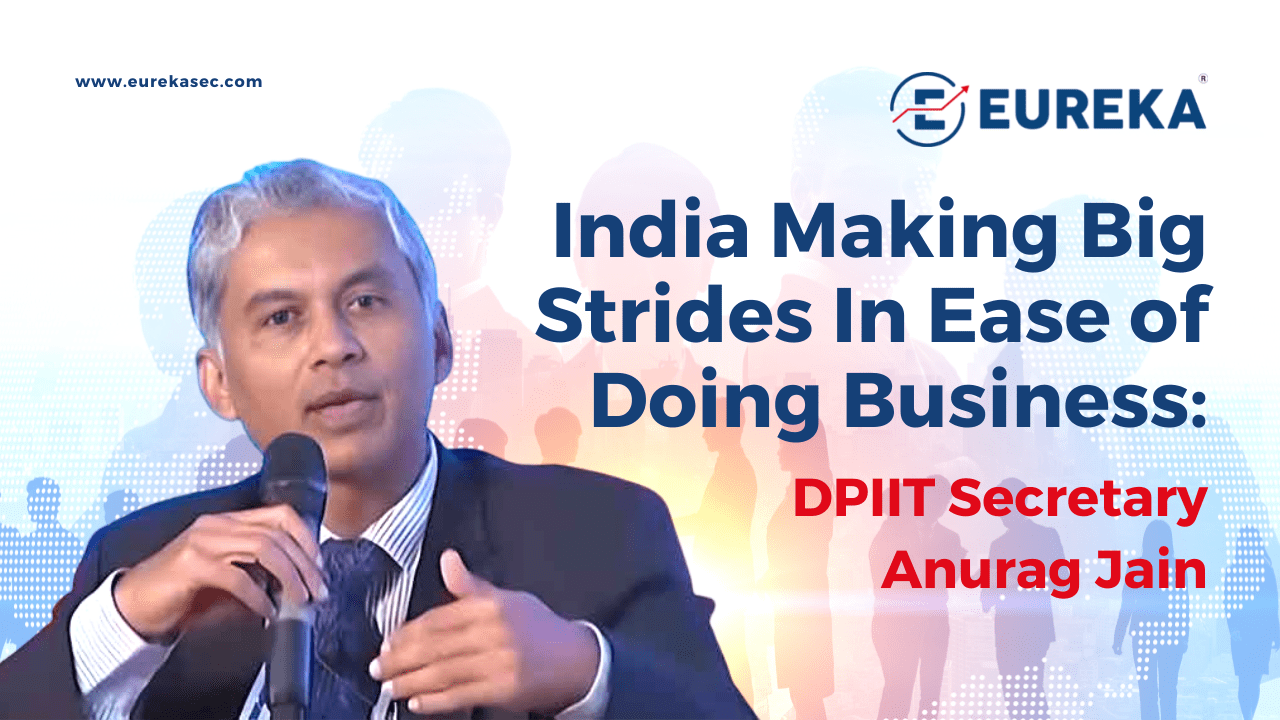
The Department For Promotion of Industry and Internal Trade (DPIIT) Secretary Anurag Jain was speaking at the breakfast session organized by the Industry Chamber CII and consultancy Giant EY on the sidelines of the World Economic Forum Annual Meeting 2023.
At this session, he said, “It is now possible to start a business in one day in India, matching the world’s best scorer New Zealand on this front.” He also said that various other steps are underway to further advance the ease of doing business in India. This includes labour law amendments. All the labour laws are consolidated and categorized into four codes. The Parliament has passed these four codes. The four codes are namely,
- The Code on Wages, 2019
- The Industrial Relations Code, 2020
- The Code on Social Security, 2020
- The Occupational Safety, Health and Working Conditions Code, 2020
The Central Government amalgamated 4 laws on the Wage Code, 13 laws in The Occupational Safety, Health and Working Conditions Code, 2020, 9 Laws in The Social Security Code, and 3 Laws in the Industrial Relations Code to ensure workers’ right to minimum wages.
Along with enhancing “Ease of Doing Business in the Country”, these labor reforms will help the nation in employment creation and productivity level of workers. This will have a massive impact on workers and nation-building overall. The benefits of the 4 labor codes shall be available to workers from unorganized and organized sectors. Employees Pension Scheme (EPS), Employees Provident Fund (EPF) and coverage of medical benefits under Employees Insurance shall be available to all the workers.
These Labor Law Codes for New India are expected to be the most impactful labor reforms in Independent India. As per Prime Minister Narendra Modi, “The reforms will ensure the well-being of our industrious workers and give a boost to economic growth. They are also shining examples of ‘Minimum Government, Maximum Governance’. The new labor codes universalize minimum wages and timely payment of wages. They give priority to the occupational safety of the workers. These reforms will contribute to a better working environment, which will accelerate the pace of economic growth. These Labor Reforms will ensure ‘Ease of Doing Business’. These futuristic legislations will empower enterprises by reducing compliance, red-tapism, and ‘Inspector Raj.’ These reforms also seek to harness the power of technology for the betterment of the workers and industry both.”
The Government of India is in the course of making final implementations. The Government of India is in the process of acquiring requisite consent from all union territories and states of India. Meanwhile, most states of India have started realizing and seeing the advantages of implementations already put in place.
Here are some benefits of codification.
- Reduction of Committees
- Web-based surprise inspection
- Common Definitions
- Use of Technology- Electronic Registration and Licensing
- Reduction of Compliance Cost and Disputes
- Single Registration, Single License, Single Statement, Minimum Forms
Here are some of the benefits of each of the Labor Codes
The Code on Wages, 2019
- Minimum Wages Review every 5 years
- Timely payment of wages to all workers guaranteed
- Guarantee of minimum wages, social security and health security to 50 crore workers of organized and unorganized sectors
- Equal remuneration to both female and male workers
- From 28.08.2017 Payment of Wages Act has increased the wage ceiling from Rs. 18000 to Rs. 24000
- To remove regional disparity in minimum wages, the provision of floor wage has been introduced.
- For the first time, around 40 crore workers in the unorganized sectors in the country have got this right.
- The determination of minimum wages has been made easy. It will be based on criteria such as skill level and geographical area.
Social Security Code, 2020
- All workers of unorganized, self-employed and organized sectors to benefit from Pension Scheme (EPFO).
- ESIC is open to workers from all sectors, including unorganized and organized sectors. ESIC hospitals, dispensaries and branches are to be expanded at a district level. The facility is to be increased from 566 districts to all 740 districts of the nation.
- Institutions working in hazardous areas to be mandatorily registered with ESIC. All plantation workers to benefit of ESIC. Any worker engaged in hazardous work shall be given the benefit of ESIC.
- The requirement of minimum service has been removed for payment of gratuity in the case of fixed-term employees.
- Employees engaged on a fixed term to get the same social security benefit as permanent employees.
- Creation of social security fund for providing comprehensive social security to both unorganized and organized sectors. A Universal Account Number (UAN) for ESIC, EPFO and Unorganized Sector workers is to be assigned.
- Creating a national database of workers of the unorganized sector through registration on Portal. Employers employing more than 20 workers to report vacancies online mandatorily. Aadhaar-based Universal Account Number (UAN) to ensure seamless portability.
The Industrial Relations Code, 2020
- In industrial establishments, a Trade Union having 51 per cent votes shall be recognized as the sole negotiating union which can make agreements with employers.
- In industrial establishments in which no trade union gets 51 per cent votes, a negotiating council of trade unions shall be constituted for making agreements with the employer.
- Industrial Tribunals to have 2 members to facilitate faster disposal of cases. Worker’s disputes to be resolved within a year in the Tribunal.
- In case of job loss, a worker will get benefits under the Atal Bimit Vyakti Kalyan Yojna. A worker in the organized sector who loses his job gets financial aid from the Government.
This is a type of unemployment allowance, the benefit of which is admissible to the workers covered under the ESI Scheme.
The Occupational Safety, Health and Working Conditions Code, 2020
- OSH Code will ease the lives of Inter-State Migrant Workers. Anomalies of the Inter-State Migrant Workers Act of 1979 have comprehensively been Chapter 7, New Labour Code For New India 16, addressed in the OSH Code.
- Under the “One Nation – One Ration Card”, an 17 New Labour Code For New India, Inter-State Migrant Worker would get a ration facility in the State he is working in, and the remaining members of their family would be able to avail of the ration facility in the State where they reside.
- A national database to be created for the Inter-state Migrant Workers.
- Mandatory helpline facility in every State for resolution of Inter-State Migrant Workers’ grievances
- Instead of 240 days, now, if a worker has worked 180 days, he shall be entitled to one-day leave for every 20 days of work done.
- Mandatory, free annual health check-ups of the workers are to be provided by the employers. • For a worker engaged in Building and other construction work in one State and moving to another State, benefit from the Building and other Construction Workers’ Cess fund will be provided.
The simplification of compliance will lead to a stable business regime for businesses to invest in and create a win-win situation for the employee and employer.
With ease in business and the rising number of businesses in the economy, economic growth is impacted positively. With good economic growth comes good investment opportunities. To leverage such opportunities, Connect With Team Eureka Today.







